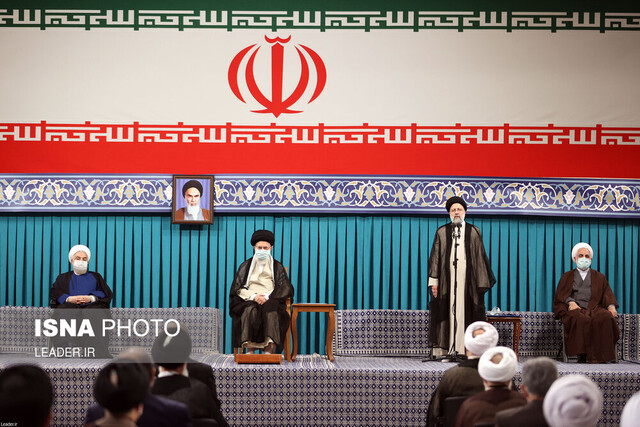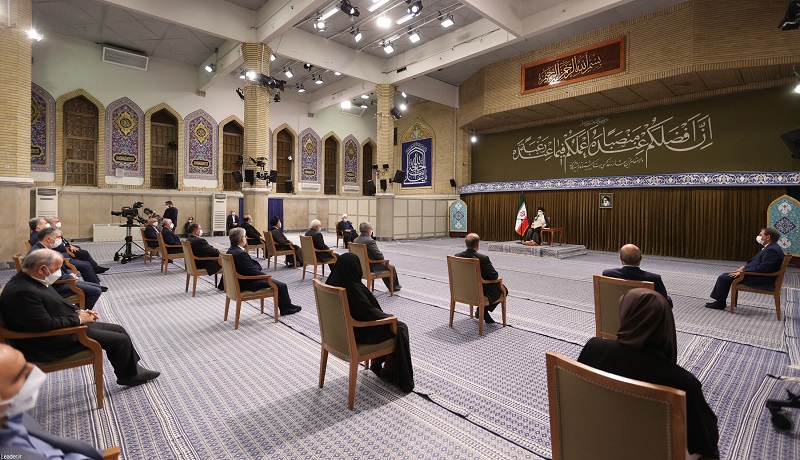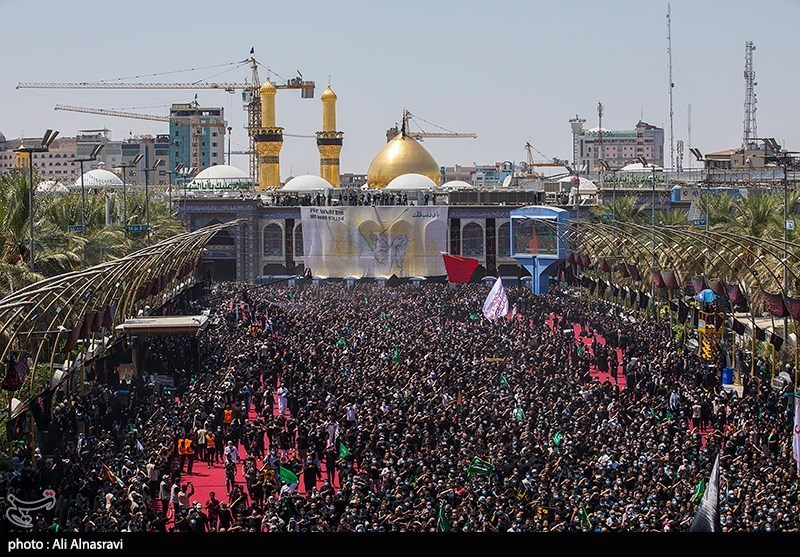
Crisis Upon Crisis in Managing Coronavirus
The editorial of Arman Melli predicts that as Iran is dealing with multiple crises, the new wave of coronavirus will soon claim more victims in the country.
As the number of hospitalizations has reached its highest since the beginning of the coronavirus outbreak in Iran, only one thing comes to mind: “coronavirus crisis.” In these days when everyone is focused on the Parliament’s anti-internet bill, a number of heads of medical sciences universities as well as physicians have urgently called for the shutdown of cities, underlining that, otherwise, Iran will face a humanitarian crisis. They have highlighted that healthcare workers are exhausted due to coronavirus.
Furthermore, independent non-governmental experts in healthcare are warning against a possible disaster in the country, saying that previously only the elderly lost their lives, but today it is the youth and even children who are losing their lives.
The latest coronavirus statistics in Iran show that the Delta variant is rapidly spreading through the country with an unprecedented number of infections and deaths since January 2020. These days we are also witnessing a 40 percent increase in the number of hospitalizations due to coronavirus and a 25 percent increase in the number of deaths compared to recent weeks and even the first and the fourth waves of COVID-19.
In neighboring countries, 70 percent of the population has been fully vaccinated, but in Iran less than 5 percent of vaccinations have been completed. Despite propaganda about record breaking vaccination levels in the country, the news shows that the rise in daily vaccinations has come to a halt. In the next two weeks, Iran will run out of vaccines – both imported and domestically produced – which means the number of infections and deaths will spike.
The country has reached a cul-de-sac in containing coronavirus, and officials are not able to control it. In the meantime, war on Iran’s eastern borders, immigration, US sanctions, climate change and economic and social inefficiencies have added fuel to the issue of COVID-19 in the country.
When coronavirus entered Iran, the disease was never controlled. Right now, there is the fifth wave and in the coming weeks the sixth wave will start.
Impact of Anti-Internet Bill on Political and Social Conflicts
The editorial of Setareh Sobh argues against the Iranian Parliament’s bill which will result in the filtering and censoring of the internet in Iran.
The most important consequence of the Iranian Parliament’s anti-internet bill is the expected increase in social and political crises and conflicts in Iran. In addition, this bill will result in widespread economic loss for different groups of people. This bill will stop some internet businesses and will add to unemployment, which will increase the level of crime and social deterioration.
One of the functions of cyberspace is to fill up the free time of youths and teenagers. With increasing restrictions on cyberspace, these youths may turn to smoking and using narcotic drugs to fill up their free time.
When individuals are disconnected from the world outside, they retreat into their own selves and have no social interaction with others, the rate of suicide increases among them. So, restricting the internet will increase the rate of suicide, as it will cut off people’s connections with the external world.
One other adverse consequence of the Parliament’s bill is its political repercussions. In recent weeks, there have been some gatherings in different parts of the country and certain slogans were chanted. It seems that due to the government’s inadequacies, the ground is set for further dissatisfaction in the country. Under these circumstances, if this bill is ratified, it can only add fuel to people’s political discontent.
If people feel that their individual freedoms are breached by flawed policy making, they will react to this and they may take to the streets. This will result in more political conflicts and the gap between the people and the state will further widen. Iranian society will not welcome this anti-internet bill and it will eventually fail.
“Fear of the Future”
As the Iranian Parliament moves forward with the so-called bill to regulate cyberspace, which is seen by many as a means of filtering and censoring the internet, the editorial of Ebtekar asserts that this bill will enrage people and will create problems for the 13th government headed by Ebrahim Raisi.
Recently, there has been talk of ratifying the bill for protecting cyberspace users by the Parliament. The majority of people and political elites have made objections to this bill in different ways as it impacts the lives of millions of people in Iran.
According to statistics, more than 2 million jobs have been created on social media platforms for Iranians. If the bill is ratified, Iranians will most probably not have access to these platforms.
This bill was proposed in the Parliament while serious problems regarding livelihoods, droughts, coronavirus, etc. have strongly impacted and enraged people. It was quite obvious that the public would strongly react to the bill, but the Iranian Parliament persisted in pushing it forward. This bill will not only make 2 million people jobless, but it will also adversely impact the free flow of information and freedom of expression, which is why people from different walks of life are against it.
This bill will even make it more difficult for the next president, Ebrahim Raisi. His government might have to implement a ratification which he had clearly promised that he would not do during his election campaign. So, this will become a serious challenge for the next government. If it doesn’t implement the ratification, it will be accused of acting illegally. And if it implements the bill, it will result in negative public perception.
Negative public perception will not allow the next government to be successful in fulfilling its big projects. That is why not only the “reformists,” but also a part of the “principlist” elite were against the bill. That some people want Raisi’s government to face such challenges at the outset means that they are sending him a serious message: not coordinating with them means the government will be crippled.
Meanwhile, fear of the future is the main cause for the eruption in public protests. High hopes for Raisi’s government might contain people’s rage. But the Parliament’s bill will add fuel to it.
Raisi’s Government and Six Enormous Challenges
With the next government headed by Ebrahim Raisi soon taking office, the editorial of Arman Melli enumerates the big problems it must immediately resolve.
For a while it has been accepted that there are numerous challenges in the country, and today everyone is talking about these challenges. The water crisis which has been talked about for years is on top of the existing challenges.
Inflation, economy, people’s livelihood, employment, and other social issues are other challenges that exist in Iran and the next government which is going to soon take office must carefully address these. The other issue is US sanctions. In the meantime, there is coronavirus which has impacted and disrupted all levels of society in Iran and across the world.
These are six enormous challenges that have impacted people’s lives throughout the country. Perhaps, it was once thought that these challenges were going to subside, but now we are not only seeing any decline in these challenges and problems, rather they are becoming more and more widespread.
Perhaps, a couple of years ago when they talked about water shortages, Sistan and Balochistan Province only came to mind. But today drought has impacted all provinces even in northern Iran. Once when they talked of social degradation, the problems faced in the metropolises came to mind, but today we see that social degradation has spread across many provinces in the country.
Today, unemployment impacts university graduates who cannot find jobs. When talking of sanctions, we see that there have been no sanctions as wide-ranging as over these past two years, which have impacted all activities in the country including oil exports, remittances etc. Coronavirus has severely hit the country causing much suffering, restrictions and problems for the people.
These challenges, therefore, have existed and have made people concerned. Protests in 2017, 2018, 2019 and the recent ones in Khuzestan show the discontent in society. Raisi’s government must find a way to alleviate these pressures and solve the problems.

Raisi in Endorsement Ceremony Regrets Not Kissing Khamenei’s Hand

Iranian Supreme Leader Ali Khamenei officially endorsed the 13th President Ebrahim Raisi in the Islamic Republic of Iran.
In this ceremony, Raisi, after receiving the endorsement order from Khamenei, expressed his regret that due to coronavirus, he couldn’t kiss the supreme leader’s hand, emphasizing that “kissing the leader’s hand is a prerequisite of politeness and respect.”
In his inaugural speech, Raisi promised he would pursue the lifting of economic sanctions and the implementation of an urgent plan for resolving people’s problems like inflation, the budget deficit and coronavirus.
While slamming the policies of Rouhani’s government regarding inflation and increasing liquidity, Raisi talked of “damage to the public trust” in government. He added that “inflation is above 44 percent and there has been a 680 percent increase in liquidity.”
Iran’s next president underscored that his government’s policies would move forward in accordance with the supreme leader’s statement called the “Second Phase of Revolution.”
In the Second Phase of Revolution which was announced in 2018 on the 40th anniversary of the victory of the 1979 Revolution, the supreme leader had underlined general issues including science and progress, morality, economy, justice, combatting corruption, lifestyle, protecting independence, freedom and national dignity.
In this ceremony, Ali Khamenei praised Ebrahim Raisi, while warning of “big powers’ malicious intentions” towards Iran. According to the Iranian supreme leader, Raisi is “popular,” “wise” and has a “brilliant and jihadi managerial record.”
Amnesty International and Human Rights Watch have called for an investigation into Raisi’s role in the extrajudicial executions of thousands of political prisoners in 1988.
Khamenei also called for the prompt formation of the cabinet, while asking the Parliament to swiftly give a vote of confidence to the ministers proposed by Raisi.
The supreme leader stressed that resolving the economic problems will take time and they will not be solved overnight or in the short run.
Khamenei didn’t say anything about important issues including foreign policy or the coronavirus crisis.
Khamenei Slams Rouhani’s Outgoing Government

In his last meeting with the outgoing cabinet, Iranian Supreme Leader Ali Khamenei openly criticized Hassan Rouhani’s government for trusting the West.
This was a few days after Rouhani had accused the Iranian Parliament and the Expediency Discernment Council for sabotaging the nuclear talks which could have led to the lifting of US sanctions.
In this meeting, Khamenei underscored the need to “distrust the West,” saying that in Rouhani’s government, it was proved that trusting the West wouldn’t work. He added that “whenever you relied on the West and America, you failed.”
The Iranian supreme leader pointed to the nuclear talks, saying that “Americans have stubbornly doubled down on their position in these talks, and haven’t taken a step forward.”
Khamenei rebuked Rouhani and his cabinet for trusting the West more than other governments.
The second term of Rouhani’s government ends on August 5, and Ebrahim Raisi will be sworn in as Iran’s next president.
The US administration calls for negotiations over Iran’s nuclear program and Iran’s support for its proxy groups in the region, but Iran’s next President Ebrahim Raisi has reiterated that his government will not give in to such negotiations.
Several Iranian sources have told Reuters that Raisi’s government, which will soon be in charge of the negotiations, wants to raise new conditions in the nuclear talks like operating advanced centrifuges and 60 percent uranium enrichment.
A few days after Khamenei’s criticism of his government, Hassan Rouhani said, “We haven’t told part of the truth to people.” His foreign minister too underlined that the 12th government, in its relationship with the world, doesn’t trust anyone, nor does it have any allies.
In his last cabinet meeting, Rouhani said, “In these years, we told people what happened. We told people the truth. Of course, we withheld a part of the truth from the people.” He didn’t further explain which part of the truth hadn’t been shared with the Iranian people.
Foreign Minister Mohammad Javad Zarif, at the end of the cabinet meeting, told reporters “We don’t trust anyone in the world; the Islamic Republic has no allies at the international level.”
Iranian authorities have always pointed to strategic relations with China and Russia, calling them Iran’s allies.
Deputy Health Minister: Coronavirus Vaccinations Started Late; We May See 800 Deaths per Day

Iraj Harirchi, the deputy to the health minister, admitted that the COVID-19 vaccination program started late in the country, adding that 90 percent of cities in the country are in the red zone now, and if health protocols are not followed, the number of deaths due to coronavirus might rise to 800.
According to Harirchi, there has been a 38 percent increase in deaths due to coronavirus, and currently one Iranian dies every four minutes, and this number will surge in the coming days.
The latest statistics issued by the Iranian Health Ministry show that 91,000 people have lost their lives due to coronavirus, but according to Iran’s Medical Council, the number of deaths due to coronavirus is up to four times more than what the Health Ministry has announced.
In the meantime, Iranian Health Minister Saeed Namaki wrote a letter to the Iranian supreme leader calling for his “serious involvement” as well as the National Security Council due to the gravity of the situation regarding the coronavirus outbreak in the country.
Namaki has said that perhaps a two-week shutdown and deploying the military and law-enforcement forces to ensure confrontation with those who breach health protocols might prove helpful.
In the same vein, the shortage of hospital beds and medications including IVs has resulted in an increase in the number of deaths due to the fifth wave of coronavirus in Iran. According to people’s reports on social media, families go from one pharmacy to another hoping to find medications and equipment like Remdesivir and IVs.
Harirchi has confirmed reports regarding the shortage of medical equipment like IVs, promising that the issue will be soon resolved.
Holding Shiite Moharram Ceremonies Amid the Coronavirus Pandemic

Despite the fifth wave of the coronavirus outbreak, the famous maddah Mansour Arzi called Moharram mourning ceremonies “battlefields,” demanding that the necessary planning for holding these ceremonies must be undertaken. Arzi underscored that the ritualistic ceremony held during the month of Moharram is the “main pillar” of the Islamic Republic of Iran, urging that banning these ceremonies will bring an end to the Iranian government.
During the month of Moharram, Shiite mourning ceremonies are held in commemoration of the Day of Ashura, and the maddahs sing ceremonial mourning songs while the crowd beat their chests.
While there is insistence on holding Moharram ceremonies, more than 90 percent of Iranian cities are in the red zone and experts have warned that holding any gathering might have irreparable consequences. But holding Moharram ceremonies is not just a religious ritual for radical “hardliners” in Iran; it also has political aims and purposes.
Years ago, the founder of the Islamic Revolution Ayatollah Khomeini had emphasized the significance of Moharram ceremonies in continuation of the Islamic Republic. And now Mansour Arzi has called them battlefields that shouldn’t be banned even during the critical conditions faced because of coronavirus.
It is not just this year that the issue of holding Moharram ceremonies has become problematic. Last year, despite strong warnings by many experts and healthcare workers during the peak of the second wave of coronavirus, Moharram ceremonies were held in many places which resulted in the early outbreak of the third wave of COVID-19.
Earlier, Mohammad Qomi, head of the Islamic Advertisement Organization, had announced that this year they will not allow the banning of Moharram mourning ceremonies, calling those who are against holding them “devils.”
It has been predicted that in the coming days and weeks, the number of deaths might rise to 800 per day.
